Historians keep looking for new excuses for him. After all, such were the times, such a mentality. However, not every crime can be justified. And we should not be silent about every one of them today.
It was impossible to hide that the Hungarian queen had only one finger on her right hand. And that it was not about just any queen, but about omnipotent in the country and highly respected throughout the continent, Elżbieta Łokietkówna it was her handicap that became the subject of widespread rumor.
"Queen of the stump" - one of the chroniclers described her unflatteringly. Of course, a foreigner, because in Hungary no one would allow themselves to make such a blunt commentary. Nobody had the courage to pursue the matter, even though everyone was bothered by this.
A cowardly king, a queen with nerves of steel
What was known for certain? In 1330, on one April morning, an unprecedented attack took place on the ruling family. The mighty noble, Felician Zach, crept into the royal dining room, then suddenly tore his weapon away and lunged at his king:Charles Robert of the Angevin dynasty.
The terrified ruler - at least this is what the author of one of the accounts says - immediately crawled under the table, abandoning his loved ones to the madman. The king's wife, 25-year-old Polish girl Elżbieta, and two underage sons stayed on the line of attack. The monarch had no choice. To save the lives of the little ones, she covered them with her own body, losing four fingers as a result.
Before the bomber could make another cut, the royal wetboys caught up with him. More and newer blows fell on the treacherous magnate. Karol Robert has not even managed to crawl out from under the table yet, and only a bloody, dismembered pulp is left of the assassin. At least he died quickly. Relatives and friends of Felicjan Zach could not count on such a gracious end.
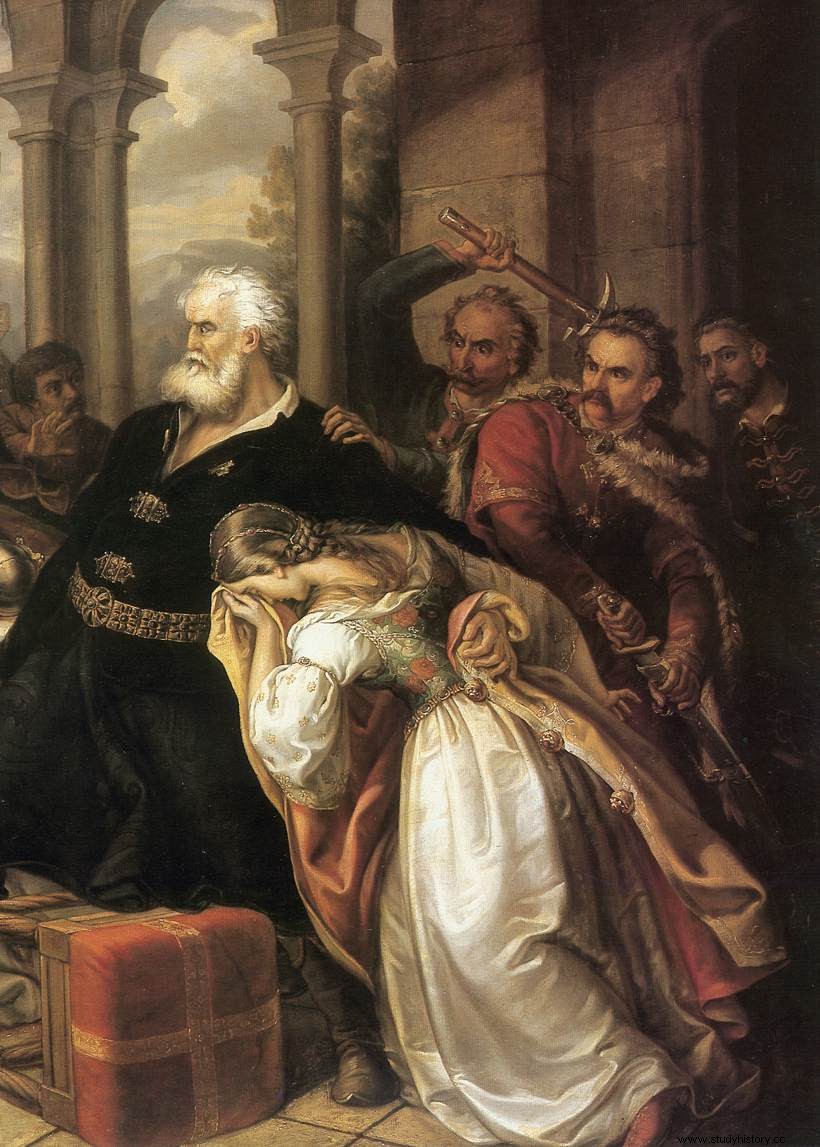
Fragment of the painting "The Wrath of Felicjana Zach" by Soma Orlai-Petrich. Second half of the nineteenth century. Visible assassin and speechless courtiers.
The bomber's only son was torn apart by horses, and the remains of his mutilated body were thrown to the dogs to be eaten. A tribunal composed of twelve barons, blindly following the will of the royal couple, also ruled that the entire Zách family was to be exterminated, up to the third degree of kinship. Felicjan's nephews and nieces, as well as all his grandchildren, were sentenced to death. Up to the seventh degree of kinship, the punishments were confiscation of property and life slavery.
Death is a salvation
The most humiliating, long-drawn-out, and brutal punishment, however, befell not Zach's sons or associates, but his daughter Clare.
Her nose and lips were cut off. Eight fingers were chopped off, leaving only thumbs . In this state, the girl was put on a horse and driven around various Hungarian cities, forcing her to repeat aloud that anyone who showed unfaithfulness to the royal couple would end up just like her. When Clare was finally beheaded, death must have been a godsend for her.
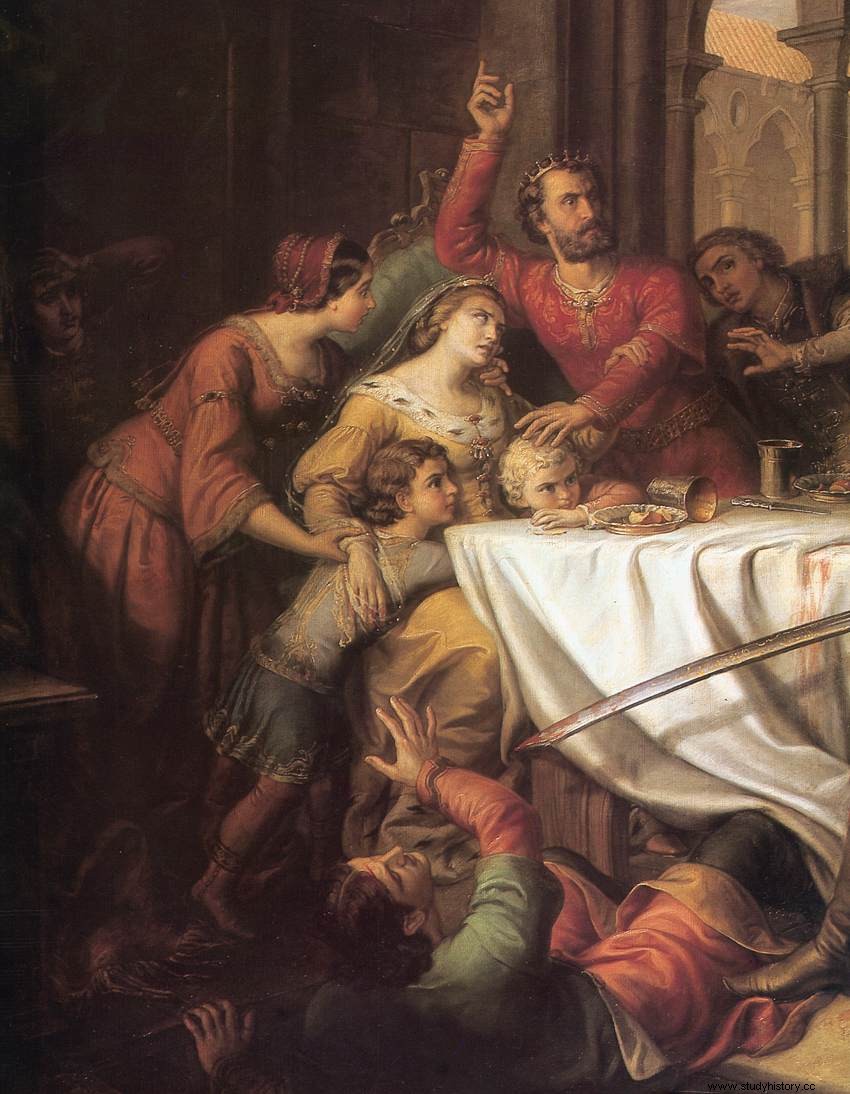
Fragment of the painting "The Wrath of Felicjana Zach" by Soma Orlai-Petrich. Second half of the nineteenth century. Visible Elizabeth and her terrified sons.
The courtiers could not understand what had happened. Klara Zach was, of course, the daughter of an assassin. But she had also been… until now, a trusted member of Elizabeth's fraucimer, who had served the bright lady for years. The monarch's faithful service apparently not only did not save the woman from execution, but even plunged her into the eyes of Piastówna. And it couldn't have been a coincidence.
Smoke screen
The royal officials did their best to conceal the background of the case. It was officially assumed that Felicjan took the life of the ruler because he was stripped of any titles and he was unable to swallow the degradation. The translation crackled at the seams.
Zach did lose the king in the eyes of the king, but it came to that… two years before the assassination attempt. Karol Robert, for unknown reasons, deprived the magnate of the castellany he had hitherto held. However, he did not seize any of his family estates, nor did he humiliate him in any way.
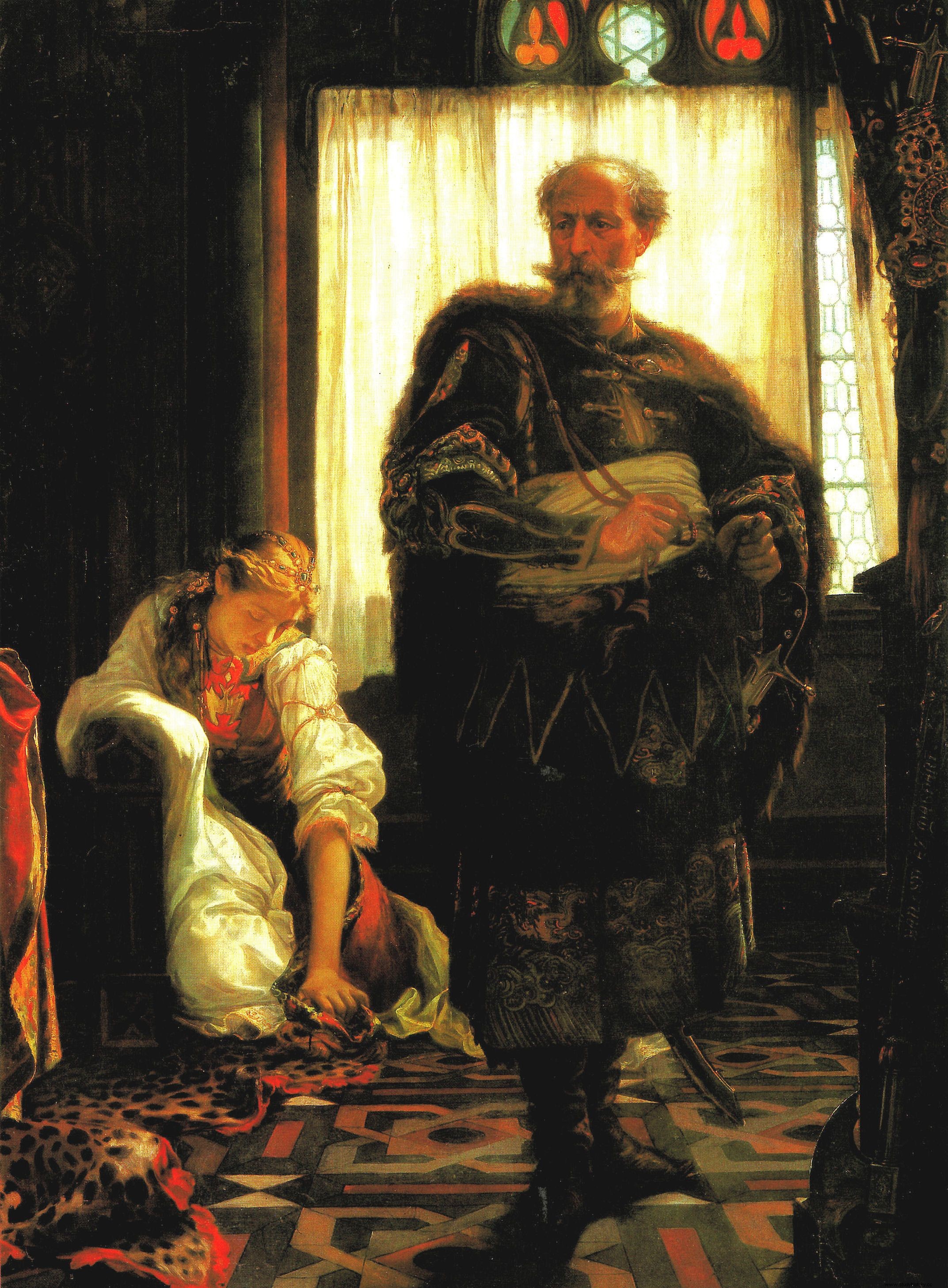
Klara in the shadow of her father. Painting by Viktor Madarász, mid-19th century.
A personal attack on the ruler could only be understood if it took place in a rush of enormous emotions, which in this case simply could not be discussed. Connecting the assassination case with the career of a magnate is only a not very successful smokescreen which was procured by the judges remaining in the service of the king.
What was the reality then? This story began to be written about while Elżbieta Łokietkówna was still alive. Although outside Hungary, of course.
Truth hidden in sources
To this day, three chronicles have survived, in which there are clues to solving the puzzle. Their descriptions vary in detail, but all the books say that Zách's agitation had nothing to do with politics. His beloved daughter Klara was hurt at the royal court. And it was this fact that pushed the magnate to a violent, ill-considered reaction.
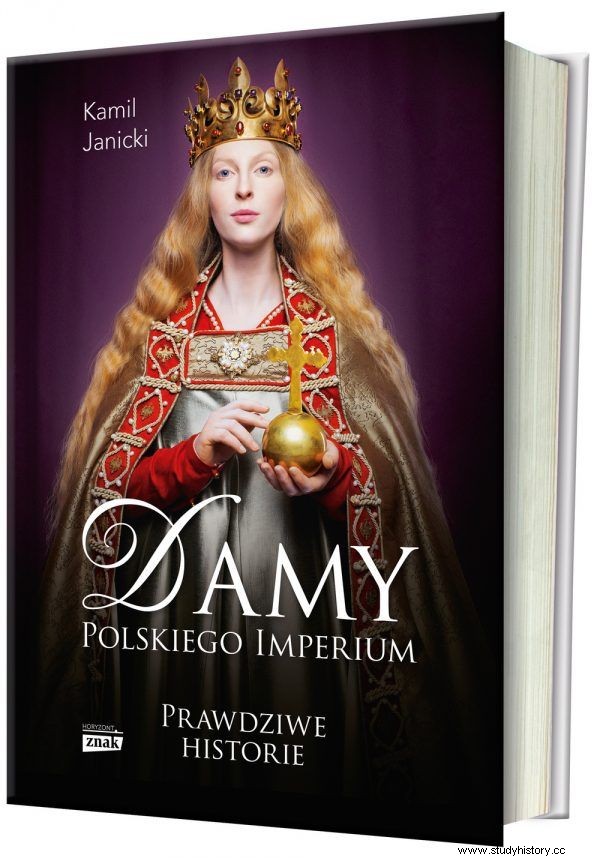
The amazing story of women who built the Polish power. Jadwiga Andegaweńska and her predecessors in a new book by Kamil Janicki:"We will give the Polish empire".
In an anonymous Italian historical book, it was noted that the manor was raped by the "nephew of the king" Charles Robert. The text was written several years after the events, and its author consulted Elizabeth's courtiers. Even if he kept repeating the rumors, it was quite fresh and sourced from the source. The Austrian chronicle of a certain Henryk von Mügeln sheds further light on the matter.
This man stayed at the Hungarian court around 1350, and he also discreetly asked the locals why the queen had only six fingers. In the account, Elizabeth comes to the fore. Henryk von Mügeln states that the ruler, instead of protecting her ward, gave her to the attacker herself.
We learn that the distinguished guest staying at the court "slept with Felicjan's daughter at the will of the queen." As soon as Clara's father found out about the girl's disgrace, he burst into Charles Robert's chambers, sword in hand, thinking only of to destroy the royal seed.
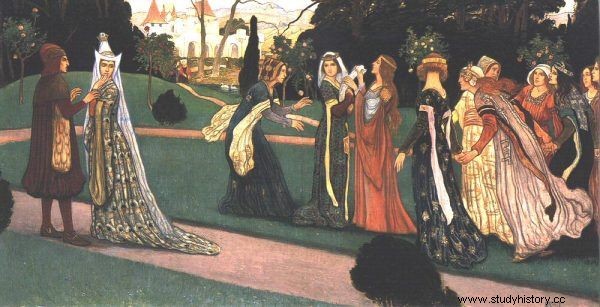
Klara Zach and Prince Kazimierz in the painting by Aladar Körösfoi-Kriesch.
The Austrian, like the Italian, was unable to clearly indicate what the rapist had in common with the royal couple. For the latter, the man was the nephew of the ruler. Henryk von Mügeln, in turn, made him brother Karol Robert. At the same time, however, he gave the title and name of the attacker. Thanks to this, we know that it was not about one of the king's siblings, but about his brother-in-law. And at the same time:the Polish heir to the throne, Kazimierz.
Sickly baby boy
Kazimierz was not the only brother of Elżbieta Łokietkówna and the only son of Władysław Łokietek. However, he was the survivor. The two older Piastowicz passed away to eternity even before reaching efficient years. As a result, only Kazimierz gave a chance to extend the family. The son was blown and puffed, pampering him and protecting him from any danger. Nothing is heard about the participation of the young prince in armed expeditions or even in hunting. He does not study too diligently, and his parents do not pay attention to keeping his nose in the books.
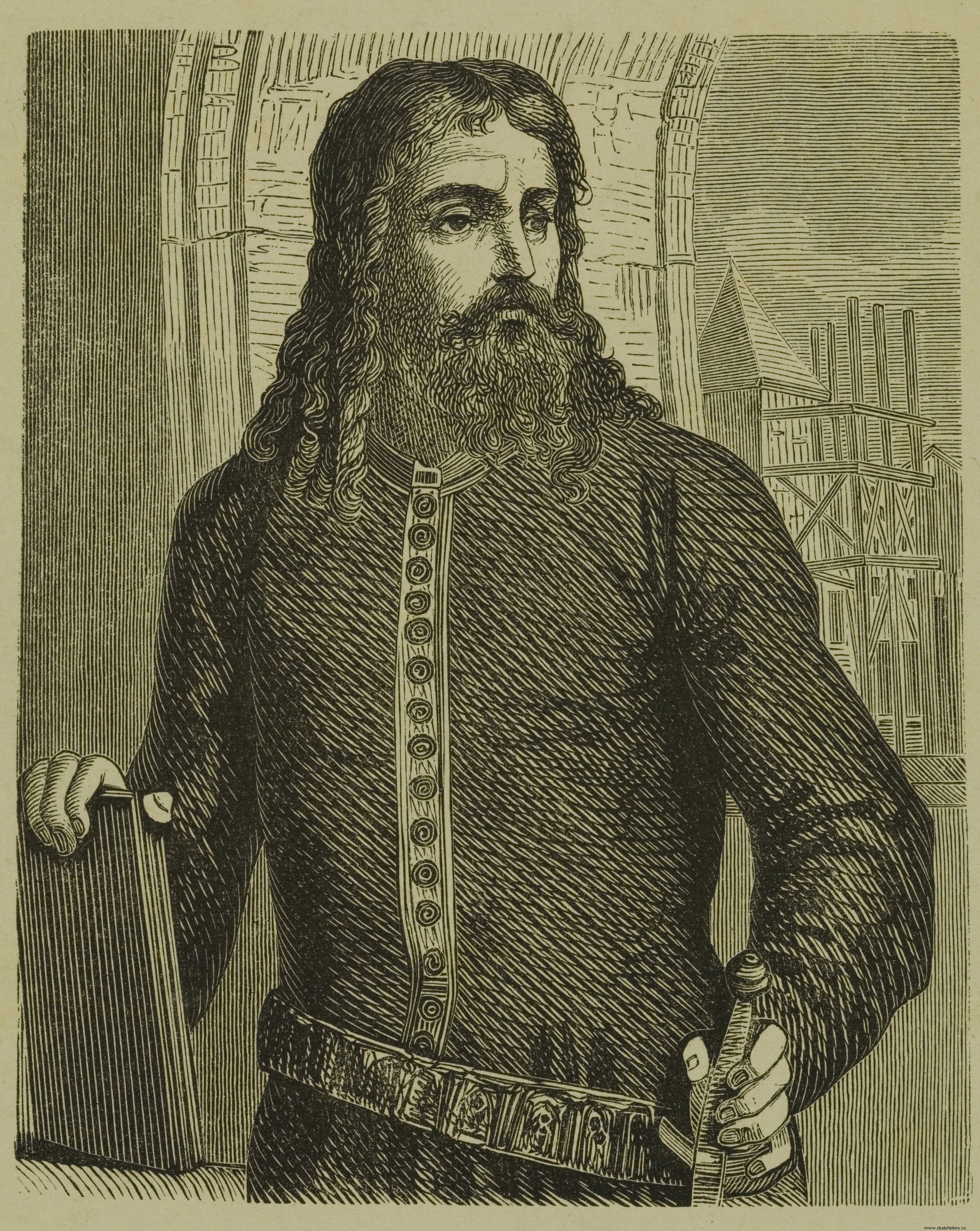
King Kazimierz in his young years. Graphics by Franciszek Ejsmond from the second half of the 19th century.
The king and queen indulged in Kazimierz the more that he was in poor health. In 1327 he drove his mother, Jadwiga Kaliska, so afraid of illness that the monarch asked for help and prayers to the Pope himself .
He was slowly returning to form, and his health continued to cause anxiety among his relatives. He would prefer to be kept in a safe golden cage, but it was impossible to stop the inexorable passage of time. Władysław Łokietek himself was more and more ailing himself, approaching the metasalem border of seventy years. Nobody expected the old man to step aside and give up power. However, you had to think about the future. And about the fact that the throne will soon be taken over by a crude little kid.
Like it or not, the 19-year-old young man had to be trained in the art of government. The game involved taking part in another war with the Teutonic Knights, which caused constant difficulties. However, the king refused to accept such a risk. Instead of sending his son to the battlefield, he ordered him to go to Hungary. At the court of his sister five years older and his brother-in-law known from strict rule, Kazimierz was to deal with politics, gain some manners and experience in palace games. By the way, he was also to ask Karol Robert for military help in the upcoming conflict with the knights.
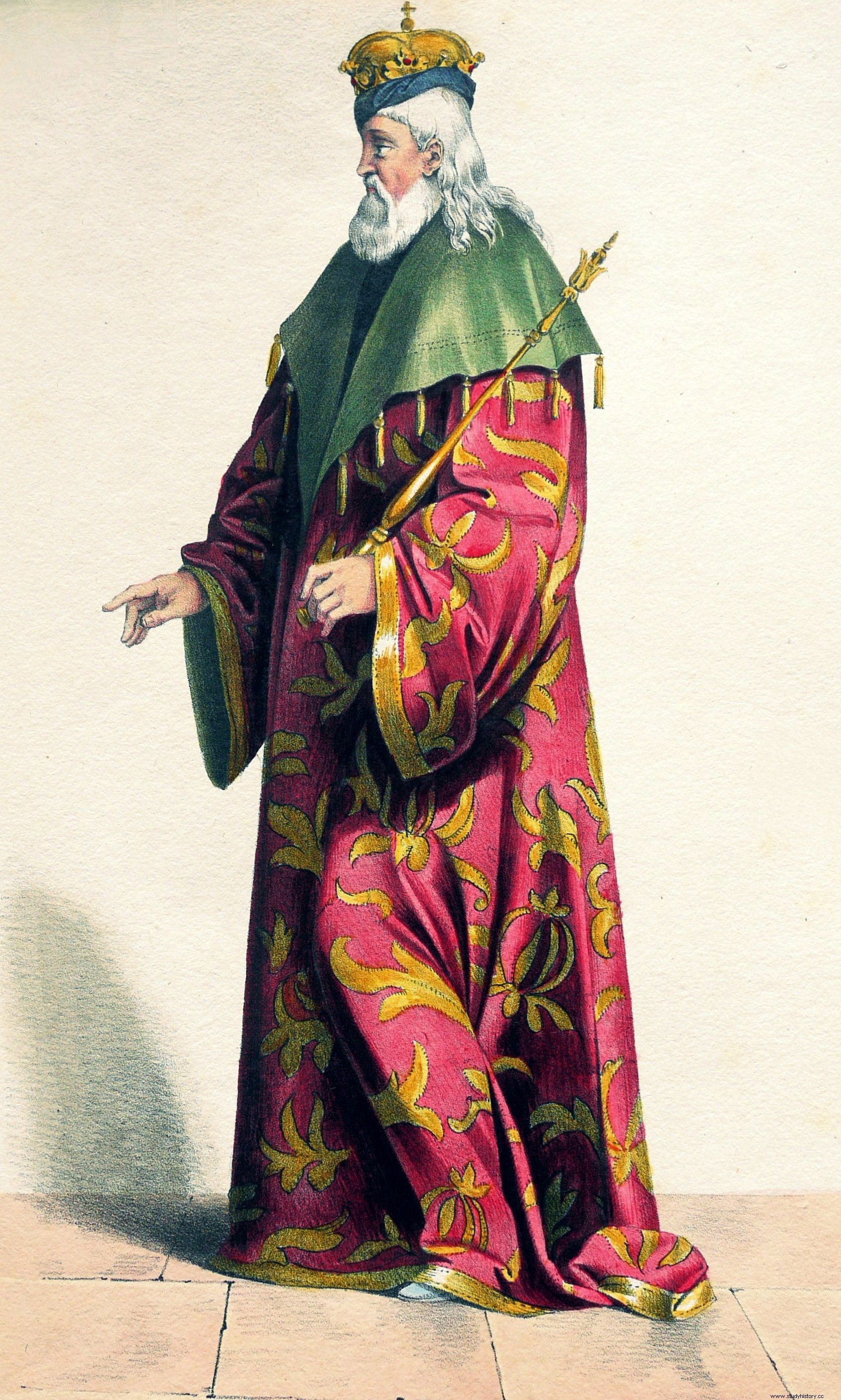
The Hungarian King Charles Robert at the end of his life. Early 19th century lithograph.
Heart torments
The prince came to Vysehrad at the end of 1329, or perhaps at the very beginning of 1330. He immediately felt at home. Just as he had taken his parents for years for pity and gained special treatment, now he was trying to simulate something from good-natured Elizabeth.
Jadwiga and Łokietek must have warned in advance that the prince's condition should be closely monitored and that medics should be called in the event of any collapse. And if you believe Jan Długosz, the condition of the heir to the throne did start to fail immediately. Elizabeth found her brother in bed weakened and lethargic.
The chronicler claimed that the insightful queen quickly understood what was wrong with her protégé. It seems, however, that it was rather Kazimierz who had to guide his sister to the source of his indisposition. He suffered physical agony because his already weak body was consumed by "heart disease".
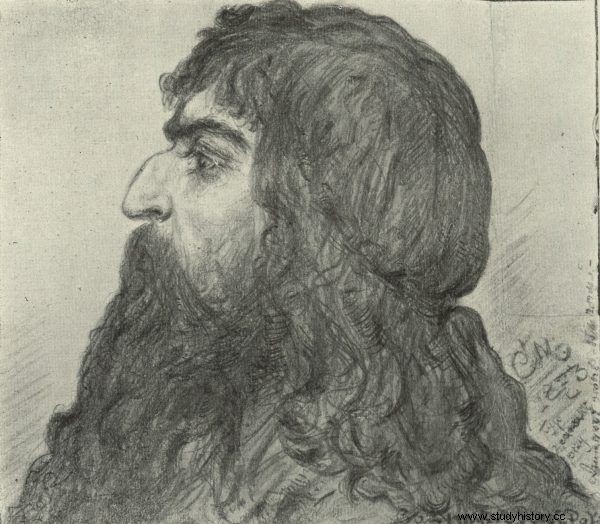
Casimir the Great on an unfinished sketch by Jan Matejko.
In the absence of his young wife, left behind in Poland, he had a sudden and unstoppable feeling for one of Elizabeth's mansions:the beautiful virgin Klara Zách. If he was to recover, it was only through meeting the woman he wanted. Alone, of course, in the same bed in which he was now lying, heavy with weakness.
Unusual medicine
Elizabeth did not mind nursing her brother in illness. However, the proposal to arrange meetings with her own manors had to take over the monarch, known for her piety, with disgust. It is very possible that the court doctors joined the game at this stage. The nineteenth-century historian Ernest Świeżawski suggested that it was the sages of medicine who recommended a romance to the young dynamo - to strengthen the body.
Such prescriptions were actually used, and until quite recently. Świeżawski himself might have come across them, because in the 1920s and 1930s, Polish doctors prescribed visits to prostitutes for men suffering from migraines and malaise.
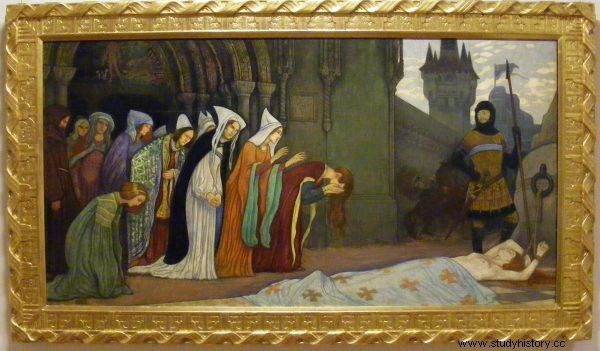
The torment of Clara Zach in the painting by Aladar Körösfoi-Kriesch.
Elizabeth must have been persuaded by a clever brother or alleged specialists. Or maybe after years of living with her husband, not very restrictive and known for jumping to the side, she has let her guard down a bit when it comes to ethics.
We learn from Jan Długosz that the ruler came to Kazimierz's chamber "as if for a visit". Then:
(...) she dismissed the patient from the ministering room - under the pretext that she was supposed to discuss something secret with him - and only stayed with Klara, who came with her.
Then, after uttering some banal words, she left, and left the said Klara with Prince Kazimierz to be raped considering it a minor offense and believing that no one will even know about it. And that it will by no means undermine Clara's good fame.
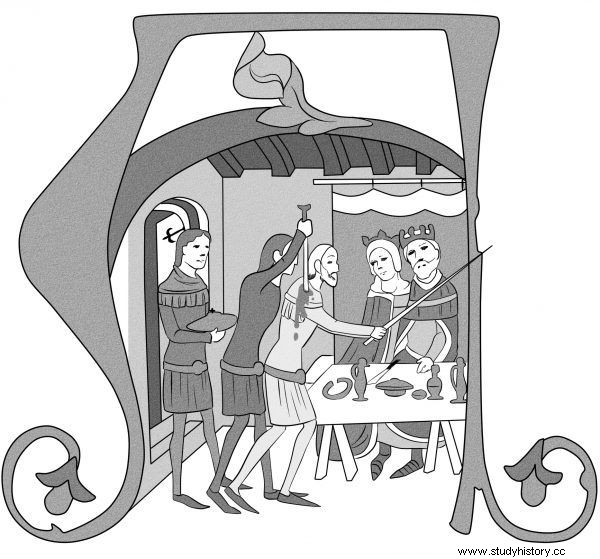
Felicjan Zach's attack on the miniature from the so-called "Illustrated Chronicle".
Male royal blood
Długosz liked to fantasize and exaggerate overheard stories. Many researchers also look for signs of falsehood in the story of the used Clare.
While it is appropriate to share general doubts about the chronicler's technique, one should be very careful in denying the vice described in three different sources. Especially that researchers from scientific criticism turn surprisingly easily to rude, chauvinistic taunts.
It is hard to talk about rape, "since, as we know from other sources, resisting male royal blood was not particularly fashionable in the maidens of that era" - says the gruffly well-known anthropologist Ludwik Stomma. It makes no sense to add here that the concept of rape has not been developed in recent years, and that in every epoch it is possible to identify women who resist sexual predators.

The amazing story of women who built the Polish power. Jadwiga Andegaweńska and her predecessors in a new book by Kamil Janicki:"We will give the Polish empire".
It seems all the more pointless to emphasize that - contrary to the claims of Ludwik Stommy - not all former "ladies" considered their bodies to be bargaining cards in the political game. Not all of them were prone to unwanted intercourse, disgrace and illegitimacy just because they caught the eye of "male royal blood" . Although it may be necessary to emphasize it, if similar comments are made even in scientific works ...It is impossible to find out what exactly happened behind the closed doors of Kazimierz's alcove. Clara believed, at any rate, that she had been hurt and that her own queen had exposed her to humiliation. Contrary to Elizabeth's predictions, the courtly did not leave the incident a secret. She was only silent until her father returned from his foreign journeys. Perhaps on her own initiative, or under pressure from Felicjan, who was worried about her distress, Klara confessed the truth. According to Długosz, even asked to avenge her shame with blood.
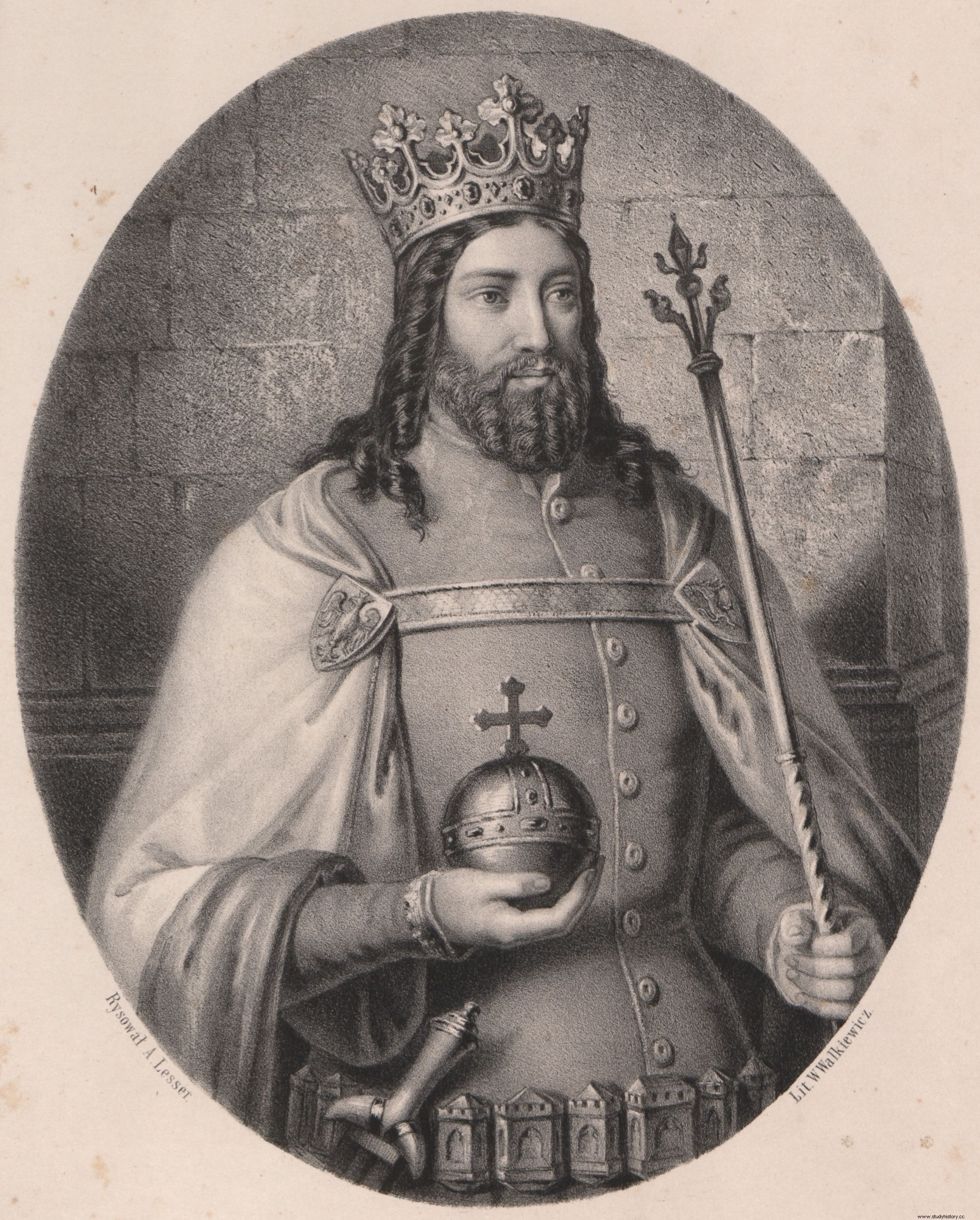
The repulsive episode of his youth did not prevent Kazimierz from gaining the fame of the greatest Polish king. Drawing by A. Lesser.
The father-daughter conversation took place after Kazimierz, pleased with himself and suddenly recovered, left the Hungarian court. One culprit evaded the punishment. However, there were still people on the spot who guaranteed Klara's safety and protection. And most of all:the monarch she served.
***
The story of Elizabeth does not end with this shameful episode. Due to her encounter with death - or perhaps also under the influence of shame and guilt - from an obedient wife and a figurine standing in the shadow of her husband, she became the most powerful ruler of this era.
I devoted my latest book to her fascinating life, as well as the fate of her granddaughter, the famous Jadwiga Andegaweńska: "Ladies of the Polish Empire. The Women Who Built a Power " .
Holy queens who fell in love with the authorities. A fascinating story of despised, ambitious and sinful women. Check where to buy:"We will give the Polish empire:women who built a superpower"
Selected bibliography:
The article was based on materials collected by the author during the work on the book "Ladies of the Polish Empire. The Women Who Built a Power " . Some of these items are shown below. Full bibliography in the book.
- Dąbrowski J., Elżbieta Łokietkówna 1305-1380 , Universitas, Krakow 2007.
- Dąbrowski J., The last years of Ludwik the Great 1370-1382 , Universitas, Krakow 2009.
- Engel P., The Realm of St. Stephen. A History of Medieval Hungary 895-1526 , I.B. Tauris, London-New York 2001.
- Kibelka J., Heinrich von Mügeln [in:] Neue Deutsche Biographie , vol. 8, Duncker &Humblot, Berlin 1969.
- Lendvai P., Hungarians. A thousand years of victories in defeats , International Cultural Center, Krakow 2016.
- Sroka S.A., Elżbieta Łokietkówna , Homini, Bydgoszcz 1999.
- Sroka S.A., The assassination of Felicjan Zach in the light of the latest Hungarian historiography , "Studia Źródłoznawcze", vol. 44 (2006).
- Stomma L., Polish kings cases , Warsaw 1994.
- Śliwiński B., Chronicle indiscretions, or the private life of the Piasts , Marpress, Gdańsk 2004.
- Śliwiński J., The marriages of Casimir the Great. A study in the field of morality and ethics of the royal court in Poland in the 14th century , Pedagogical University in Olsztyn, Olsztyn 1987.
- Świeżawski E.S., Esterka and other women of Casimir the Great [in:] the same, Outlines of critical research on history, historiography and mythology , vol. 3, Warsaw 1894.
- Zajączkowski S., Poland and the Teutonic Order in the last years of Władysław the Short , Scientific Society in Lviv, Lviv 1929.
- Zientara B., Casimir the Great - that is, at a turning point in history , "Kultura", No. 44 (1970).
